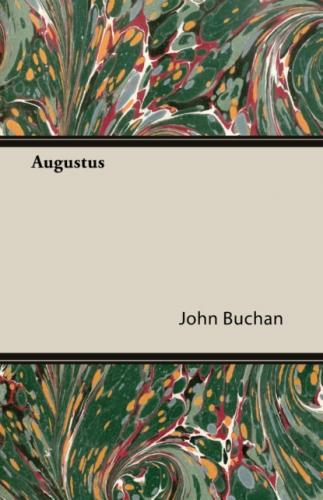JOHN BUCHAN
(LORD TWEEDSMUIR)
AUGUSTUS
“Immensa Romanae pacis majestas.”
Copyright © 2013 Read Books Ltd.
This book is copyright and may not be
reproduced or copied in any way without
the express permission of the publisher in writing
British Library Cataloguing-in-Publication Data
A catalogue record for this book is available from the
British Library
John Buchan
John Buchan, first Baron Tweedsmuir of Elsfield, was born in Perth, Scotland in 1875. In his youth, his father immersed him in the history, legends and myths of Scotland, and he was an avid reader, stating some years later that John Bunyan's The Pilgrim's Progress was a “constant companion” to him. Buchan’s education was uneven, but at the age of seventeen he obtained a scholarship to study classics at Glasgow University, where he began to write poetry. His first work, The Essays and Apothegms of Francis Lord Bacon, was published in 1894, and a year later he enrolled at Oxford University to study law.
In 1900, Buchan moved to London, and two years later accepted a civil service post in South Africa. In the years leading up to World War I, he worked at a publishers, and also wrote Prester John (1910) – which later became a school reader, translated into many languages – as well as a number of biographies. In 1915, Buchan became a war correspondent for The Times, and published his most well-known book, the thriller The Thirty-Nine Steps. After the war he became a director of the news agency Reuters.
Over the course of his life, Buchan would eventually publish some one hundred books, forty or so of which were novels, mostly wartime thrillers. In the latter part of his life he worked in politics, serving as Conservative MP for the Scottish universities and Lord High Commissioner of the Church of Scotland (1933-34). In 1935, Buchan moved to Canada, where he became the thirty-fifth Governor General of Canada. He died in 1940, aged 64.
AUGUSTUS
Museo Civico, Ancona
BOOKS BY JOHN BUCHAN
SCHOLAR-GIPSIES, 1896
JOHN BURNET OF BARNS, 1898
A HISTORY OF BRASENOSE COLLEGE, 1898
GREY WEATHER, 1899
A LOST LADY OF OLD YEARS, 1899
THE HALF-HEARTED, 1900
THE WATCHER BY THE THRESHOLD, 1902
THE AFRICAN COLONY, 1903
THE TAXATION OF FOREIGN INCOME, 1905
A LODGE IN THE WILDERNESS, 1906
SOME EIGHTEENTH CENTURY BY-WAYS, 1908
PRESTER JOHN, 1910
SIR WALTER RALEIGH, 1911
THE MOON ENDURETH, 1912
SALUTE TO ADVENTURERS, 1915
THE THIRTY-NINE STEPS, 1915
GREENMANTLE, 1916
POEMS, SCOTS AND ENGLISH, 1917
MR. STANDFAST, 1919
THE SOUTH AFRICAN FORCES IN FRANCE, 1920
FRANCIS AND RIVERSDALE GRENFELL, 1920
THE PATH OF THE KING, 1921
A HISTORY OF THE GREAT WAR, 1921-22
HUNTINGTOWER, 1922
MIDWINTER, 1923
THE THREE HOSTAGES, 1924
LORD MINTO: A MEMOIR, 1924
JOHN MACNAB, 1925
THE ROYAL SCOTS FUSILIERS, 1925
THE DANCING FLOOR, 1926
HOMILIES AND RECREATIONS, 1926
WITCH WOOD, 1927
THE RUNAGATES‘ CLUB, 1928
MONTROSE, 1928
THE COURTS OF THE MORNING, 1929
CASTLE GAY, 1930
THE KIRK IN SCOTLAND, 1930 (With Sir George Adam Smith)
THE BLANKET OF THE DARK, 1931
SIR WALTER SCOTT, 1932
JULIUS CAESAR, 1932
THE GAP IN THE CURTAIN, 1932
THE MAGIC WALKING-STICK, 1932
THE MASSACRE OF GLENCOE, 1933
A PRINCE OF THE CAPTIVITY, 1933
GORDON AT KHARTOUM, 1934
THE FREE FISHERS, 1934
OLIVER CROMWELL, 1934
THE KING’S GRACE, 1935
THE HOUSE OF THE FOUR WINDS, 1935
THE ISLAND OF SHEEP, 1936
AUGUSTUS, 1937
MEMORY HOLD-THE-DOOR, 1940
CANADIAN OCCASIONS, 1940
SICK HEART RIVER, 1941
THE LONG TRAVERSE, 1941
TO MY FRIEND
WILLIAM LYON MACKENZIE KING
FOUR TIMES PRIME MINISTER OF CANADA
PREFACE
THIS book is an attempt to understand a little part of the mind of a great man. In my youth I was fascinated by Julius Caesar, and was ready to believe, with Mommsen and his school, that the constructive ideas commonly attributed to his great-nephew were born of his genius. As my studies continued I felt this view to be untenable, and not less that other which seems to be taking its place to-day, and which would make Agrippa the true architect of the Roman empire. I came to see that Augustus, while he had able colleagues—and one of his gifts was his power to choose collaborators—was always the master designer and the chief executant. I seemed to find in his work a profound practical intelligence which is even rarer in history than a seminal idealism. Consequently since my undergraduate days Augustus has inspired me with a lively interest, which has been sustained by such experience as I have had, under varied conditions, of those problems of government which are much the same in every age. Two Canadian winters have enabled me to complete a task begun many years ago.
Gibbon complained that he had to “collect the actions of Trajan from the glimmerings of an abridgment or the doubtful light of a panegyric.” The authorities for Augustus are scarcely more satisfactory. The chief contemporary sources are lost: the thirteen books of Augustus’s own autobiography; the three books of the correspondence between him and Cicero; the memoirs of Agrippa; the works of Asinius Pollio and Messalla Corvinus; the thirty books of Livy which covered the period from 44 to 9 B.C.; the pamphlets of men like Oppius and Julius Saturninus, and most of Nicolaus of Damascus. Much of our material, too, for the understanding of Roman thought and society is gone: nearly all the minor poets; a good deal of Cicero; the plays which were not paraphrases from the Greek, after Plautus or Terence, but true transcripts of Roman life. Some of these lost sources are no doubt embodied in the work of later chroniclers, but it is impossible to know what is an authentic borrowing and what is the author’s gloss. Apart from minor contemporaries like Strabo and Velleius, we are chiefly dependent on authors who lived from half a century to two centuries later—Plutarch, Appian, Suetonius, the two Plinys, and Dio Cassius, and these were moralists or gossip-writers,
